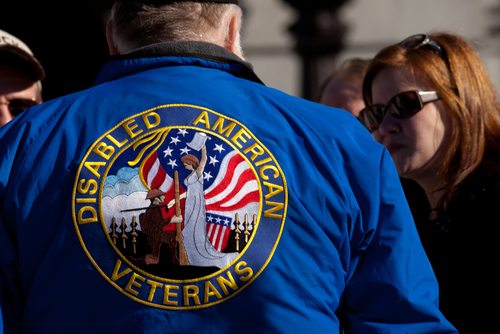
Mark Van Scyoc / Shutterstock.com
Winter 2014;Philanthropy Magazine
Thomas Meyer has been doing great work for the Philanthropy Roundtable monitoring and publicizing foundation-funded programs for veterans, but his article in the latest Philanthropy magazine, titled “Real Opportunities for Veterans,” is an unfortunate ideological turn. He suggests that the VA system for compensating disabled veterans has made these returning heroes and heroines focus on identifying themselves as disabled, rather than progressing into education and jobs. He proposes that veterans voluntarily forego disability payments in return for participating in a foundation-funded “one- to three-year stream of medical, rehabilitative, educational, and job-placement resources that would prepare them to thrive.”
Meyer’s theory is that the nation’s current system of disability payments is “often harmful…monetary patronization” that “is not sustainable, not necessary, and not in the best interests of many of today’s veterans.” He also suggests that the current system is backlogged by all of the disability claims, distracted by processing claims rather than helping disabled veterans, and running up lifetime costs that, in terms of disability compensation for already enrolled Iraq-Afghanistan veterans, will be above $425 billion. He suggests that the system, due to its “perverse incentives,” leads veterans into a life of “waiting at home for disability checks that disconnect them from the active habits, personal satisfactions, and social linkages of self-supporting work.”
Since Meyer acknowledges that the disability checks are “modest” or “small,” it is hard to imagine that these small payments are sufficient enough to lure veterans with disabilities into lives of passive dependency. The federal government’s disability compensation rates for veterans make “modest” an understatement.
Sign up for our free newsletters
Subscribe to NPQ's newsletters to have our top stories delivered directly to your inbox.
By signing up, you agree to our privacy policy and terms of use, and to receive messages from NPQ and our partners.
What is missing in Meyer’s prescription is the idea that such small disability payments could and should co-exist with privately funded—and government-funded—programs for disabled veterans. They aren’t mutually contradictory. Veterans shouldn’t be encouraged to divorce themselves from disability payments to participate in a conservative philanthropic experiment for providing medical, rehabilitative, educational, and job-placement assistance, because the VA payments for the veterans—and their dependents—do contribute to the veterans’ stabilization in their return to civilian life.
The other problem in Meyer’s scheme concerns philanthropy itself. While there are a number of foundations that have put resources into programs for disabled veterans, there is hardly a deluge of philanthropic money flowing in this direction. Programs that convene foundations on this topic seem to draw pretty much the same coterie of foundations time and time again. Many foundations respond that they are concerned about this issue and supportive of veterans, but they don’t have grant programs on veterans’ issues or for veterans programs.
But the Philanthropy Roundtable’s ideological message, which favors private funding as an alternative to funding from tax revenues and views government “entitlements” as inevitably turning disabled veterans into “wards of the state,” infects some of Meyer’s otherwise useful observations about what makes veterans programs work. The article has the feel of conservative philanthropic social engineering, using disabled veterans as an artificial vehicle for a statement about the purportedly debilitating effect of government entitlements, consistent with the perspectives of funders such as the Bradley Foundation and the Simon Foundation, and of board members with backgrounds in think tanks like the Acton Institute, the Manhattan Institute, and the Center for Individual Rights.
Meyer’s prescriptions for veterans with disabilities look in places like a potpourri of ideas—internships, matched savings accounts (like IDAs), mentoring, financial planning, wilderness training, Segway transporters, and more. He describes them as “independence-bolstering resources” that wouldn’t debilitate disabled veterans with the allure of bad disincentives, but offer incentives that would help them take advantage of opportunities for getting back into the mainstream of the U.S. economy. He’s right that there should be resources for getting veterans jobs and education, but for disabled veterans, they should be intensive, concentrated service programs, lest the legitimate, serious needs of disabled veterans become demeaned and ignored. There is nothing in the prescription for intensive services that necessitates a lessening of disability compensation payments for disabled veterans.
Many of the programs that provide the intensive, front-loaded job preparation and placement are generally government-funded. It is programs through the VA and the Department of Labor that power the programs that do the intensive, long-term career support helping disabled veterans find education and jobs. The idea that philanthropy will take the place of these government-funded programs is conservative wishful thinking.
Could the VA do better with processing the backlog of disability claims? Of course, and under General Eric Shinseki’s leadership, the VA is finally putting its house in order. Is there a role for philanthropy to play in making intensive programs for disabled veterans more available? Ask any of the nonprofit networks that provide services and support to disabled veterans and they will agree, but most almost certainly believe that philanthropy should supplement, not be a substitute for, government funding. Advocacy for greater philanthropic engagement in programs for disabled veterans is fine, but that shouldn’t be contorted to make a conservative political point against government-funded entitlements and government-funded programs that defies common sense and on-the-ground realities.—Rick Cohen













